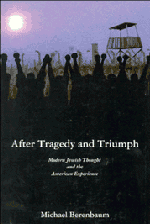Book contents
- Frontmatter
- Contents
- Foreword
- Introduction
- PART I THE HOLOCAUST IN CONTEMPORARY AMERICAN CULTURE
- 1 The Nativization of the Holocaust
- 2 The Uniqueness and Universality of the Holocaust
- 3 Public Commemoration of the Holocaust
- 4 Is the Centrality of the Holocaust Overemphasized? Two Dialogues
- 5 Issues in Teaching the Holocaust
- 6 What We Should Teach Our Children
- 7 The Shadows of the Holocaust
- PART II JEWISH THOUGHT AND MODERN HISTORY
- Notes
- Index
5 - Issues in Teaching the Holocaust
Published online by Cambridge University Press: 06 January 2010
- Frontmatter
- Contents
- Foreword
- Introduction
- PART I THE HOLOCAUST IN CONTEMPORARY AMERICAN CULTURE
- 1 The Nativization of the Holocaust
- 2 The Uniqueness and Universality of the Holocaust
- 3 Public Commemoration of the Holocaust
- 4 Is the Centrality of the Holocaust Overemphasized? Two Dialogues
- 5 Issues in Teaching the Holocaust
- 6 What We Should Teach Our Children
- 7 The Shadows of the Holocaust
- PART II JEWISH THOUGHT AND MODERN HISTORY
- Notes
- Index
Summary
In the decade of the 1970s} the teaching of the Holocaust in American universities increased io}ooo percent (from two courses in 1969 to two hundred in 1979). In the 1980s, the number has increased tenfold to two thousand courses. Nevertheless, there is little agreement on content or perspective. Whose history is to be taught: the perpetrator's, the victim's, or the bystander's? Neither is there consensus on where to begin the study of the Holocaust or when to conclude it (in terms of roots and repercussions). Should a course begin with religious leaders like the Apostle Paul or Martin Luther, with political antisemites or racists like Karl Lueger or Arthur Compte De Gobineau, with historical events like the Treaty of Versailles or Hitler's putsch? In this chapter I review the pedagogical controversies and suggest appropriate parameters for academic instruction.
Because of the nature of the subject, teachers of the Holocaust bear special burdens – moral, educational, and emotional. This chapter examines the many issues that shape Holocaust education.
The Holocaust was a watershed event in Western history, a paradigmatic manifestation of human evil intensified by the power of the state, fueled by technological and scientific accomplishment, and unchecked by moral, social, religious, or political constraints. The fact that the Holocaust was perpetrated not by an archaic, maniacal fringe but by the most cultured and scientifically advanced of Western societies presents us with a fundamental challenge. Whether restricted to the past ot a harbinger of the future, the Holocaust is a frightful indictment of contemporary existence. Slowly, the study of the Holocaust has made its way into academe as a legitimate field of research.
- Type
- Chapter
- Information
- After Tragedy and TriumphEssays in Modern Jewish Thought and the American Experience, pp. 61 - 67Publisher: Cambridge University PressPrint publication year: 1990



